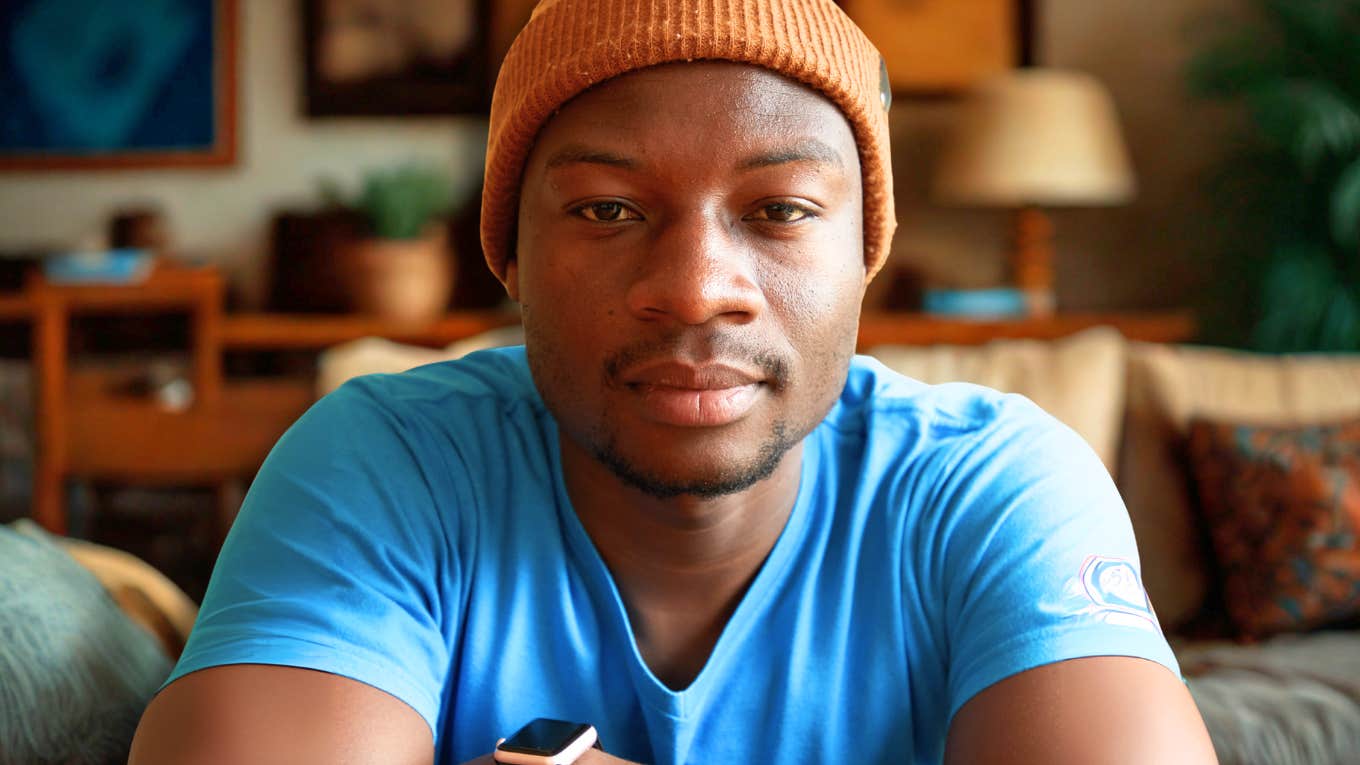I Stopped Using My White Name With White People — 'If You Can't Pronounce My Real Name, That's Your Issue'
The name I was born with is important, whether someone can pronounce it or not.
 Laker | Canva
Laker | Canva “Hi, my name is Mwangi…” A second passed. Then another. Everyone had their eyes on me — the only Black person in the room. A few of them squinted, but they all remained mute.
I still recall the silence that followed my introduction at the first university residence meeting. That was the beginning of a quiet, recurring negotiation with myself. An existential question settled in my mind after that pause.
I asked myself a question I never thought I’d entertain: Should I change my name so others feel more comfortable?
In time, my hesitation gave way to a yes. And so, Mwangi became James.
I didn’t grow up in a place where I was constantly reminded that I was Black. In Kenya, I belonged to the rhythm of the crowd. My name, skin, and accent — all blended into a shared familiarity.
Canada was a sharp contrast. Here, I stood out before I even opened my mouth. My skin was a signal, my voice an accent, and my name a challenge. Many interactions echoed the same unspoken question: What are you doing here?
The awareness came in waves. I recall walking into a grocery store and noticing that eyes lingered a little longer. I’d hear people speak freely about “Canadian values” in ways that implied everything I wasn’t.
And my name? — That became a daily test of patience. Baristas would ask me to repeat it three times before I resorted to:
“All good, I go by James if it’s easier.” I’d catch little signs of relief on their faces.
 wavebreakmedia / Shutterstock
wavebreakmedia / Shutterstock
Classmates would skip over my name when meeting for study groups, and people would try to laugh off their mispronunciations, as if my identity were a punchline.
My name became a filter through which I measured whether a space was safe, tolerant, or just indifferent.
It wasn’t one to roll off people’s tongues here like your average “Frank” or “Bill.” Living in Kelowna, a predominantly white town in Western Canada, was a stark reminder of that. I didn’t quite belong.
It’s disorienting watching yourself become a spectacle in real time — very disorienting. When your name — a word that has been rooted in family and culture — becomes something that makes others hesitate or dismiss.
I began to internalize that discomfort, wondering if I was the cause of the problem. Things could be easier for me if I made it easier for them. And eventually, I did.
The first time I used “James” at Starbucks, the barista smiled without hesitation: no order blunders, no spelling mistakes, and no awkward laughs.
“That was easy.” I had to admit — it worked. From that day on, James showed up at study group meetings, networking events, and job interviews.
James got the responses. James got callbacks. James smoothed out the friction in everyday interactions.
The satisfaction that comes with being accepted hits differently. Everything feels less hostile, less foreign. Because for a moment, I got to blend in. I got to breathe.
But the tradeoff? He never truly felt like me.
Every time I heard “James”, I felt a flicker of detachment. As if I were watching myself slip into an acting role like Chris Rock in Down to Earth, wearing a costume stitched together from necessity.
It was easier for them. But Mwangi has always been the real version of me.
The lie wasn’t in what I said, but what I didn’t.
Like when someone introduced me to others as James, and I didn’t bother correcting them. Like when I signed emails with a name I barely recognized. Even when I just showed up as someone lighter and simpler.
But something jolted me awake, and I started asking: What parts of myself am I dimming to make others feel brighter? So while James got the job, I sometimes wondered if Mwangi ever had a chance.
My birth name isn’t just a random arrangement of syllables — it carries the memory of my grandfather, the soil of my homeland, and the legacy of my ancestors.
In my tribe, it translates to “rapid expansion” — summoning growth, movement, and territory.
African names aren’t just identifiers. They are declarations. They speak to who you are, who you come from, and who you’re expected to become.
The naming of a child is ceremonial. Spiritual. When I was born, my parents didn’t flip through a baby name book — they reached back through the bloodline and drew from our lineage.
I was named after my grandfather, whose stories I carry now. My name is a bridge to him, to my village, and roots deeper than any present address.
“James” was given to me in baptism. A name meant to anchor me in faith, but one that also ties me to a colonial history I hadn’t yet understood. In church, my name felt like a virtue—a lineage of apostles and saints.
But looking back, I see how names like James, John, Mary, or Elizabeth weren’t just biblical — they were Western.
Introduced through missionaries who brought both salvation and extermination, they replaced indigenous names with those easier to pronounce for European settlers.
So while Mwangi roots me in ancestry, James links me to a version of Christianity braided tightly with whiteness: a religion that, in many African households, came wrapped in respectability, English grammar, and the silent pressure to assimilate to the colonizers.
The irony is that people often say names are important. To me, that translates to, “Your name is important — only if I can pronounce it.”
“Only if it fits comfortably in my mouth. Only if it sounds familiar, Western, and uncomplicated. But if it requires more than that — if I have to listen twice or slow down — then it’s up for negotiation.”
No one tells you of the invisible weight that comes with being a cultural outsider, especially when you’re not just visiting, but trying to build a life. I started rehearsing a mental script before every social interaction:
Don’t speak too passionately, don’t use that phrase, don’t correct their pronunciation, and don’t EVER bring up race.
Even humor didn’t translate. Jokes I’d tell back home would either fall flat, be met with puzzled looks, or give nervous chuckles over here.
So I adapted. I borrowed phrases, mimicked intonations, and trained my tongue to sound a little more like everyone else. I learned what kind of slang felt acceptable, what kind of references earned nods instead of blank faces.
Bit by bit, I chipped away the parts of myself just for the white man’s stamp of approval. I never stopped being myself, but I was constantly adjusting how much of myself I could safely show.
Even today, when someone says my non-white name correctly without hesitation, I feel an unexpected warmth. It’s a small act, but it tells me they see me. Not just the version I’ve curated, but the whole of me.
To say someone’s name correctly is to honor where they come from. And to learn it is to affirm that they belong.
It’s easy to frame this story as a betrayal: me giving up my real name, toning down my culture, and laughing off the awkwardness.
But the truth is more complicated than that. It’s not self-hate — it’s self-preservation. There’s a difference between choosing to assimilate and being made to feel like you don’t have a choice. In Kelowna, the choice was clear:
Adapt or be misunderstood. Translate, or be left out.
“James” was my shield. It let me walk into rooms without explaining myself. It helped me avoid the endless cycle of correcting, clarifying, and justifying that Mwangi required. With James, I was social proof, but with every use of it, I felt increasingly disconnected.
Sometimes I thought I was being too sensitive, and I should tough it out. But then I’d catch myself hesitating before introducing myself, or preemptively offering my “white” name before anyone even asked. That’s not confidence. That’s conditioning.
And yet, it worked. I got the job. I got the smile. I got the callback. I got the silence to stop.
In return, I bargained away my freedom.
Survival teaches us lessons that betrayal never does — how to read a room, how to share the safe parts of ourselves, and how to navigate a society not built with us in mind. But once we see the cost of our silence, we begin to find our native voices again.
 fizkes / Shutterstock
fizkes / Shutterstock
I started by reclaiming my birth name: Mwangi
It started slowly — almost timidly. I began correcting people again and letting the silence stretch when they stumbled on my name, saying it once, then repeating it without apologizing.
Reclaiming my name has been about living up to it, Mwangi — “rapid expansion” — taking up space that had always felt like borrowed territory.
Now, years later, I find myself choosing Mwangi every time. Not because it’s easier — it still isn’t — but because it’s real. When I say my name out loud and let it land, I’m reminding myself that I deserve to exist in full view, not reduced, not rebranded — just me.
It’s not up for negotiation anymore. The discomfort of being fully seen is far more honest than the comfort of being half-known.
Names carry worlds, and I’ve stopped shrinking mine for mouths too small or hearts too closed to hold it.
So when I say Mwangi, learn it. Try. Get it wrong. Try again. I’ll even meet you halfway. But my name isn’t going anywhere. Not now. Not ever.
Mwangi Wanjau is a freelance writer and blogger. His work explores themes of identity, social justice, and global citizenship. Mwangi's work has been featured on Medium's "Staff Picks" and the Business Insider.

